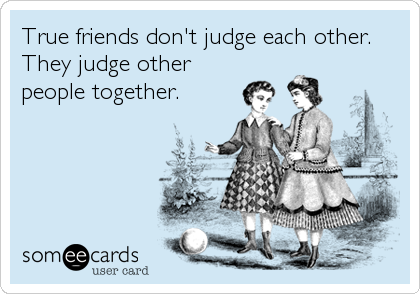Is gossip good for friendship?
Gossip fuels connection but can shatter trust...so should we be doing it?
A warm welcome to my new subscribers this week, and a special mention to Hayley and Petra who signed up on my birthday! I was 42 on Thursday. I see people writing ‘42 things I’ve learnt in 42 years’ type posts, but I’m not feeling that wise if I’m honest. It seems to me, the longer I go on, the less sure I am about everything. I guess I’ll just keep asking questions. Today…is it ever good to gossip?
gossip (noun)
Conversation or reports about other people’s private lives that might be unkind, disapproving, or not true:
her letter was full of gossip
have a gossip about Jane and Lyn sat in the kitchen having a good gossip about their friends.
I have been in a friendship group who wore this vibe as a badge of honour. It feels like a tribal thing. If you are in, you’re in….and if you’re not, then you are very much out. I was in, and it’s really quite fun being in. You get invited to stuff and you don’t feel lonely. When you are in you go along with the vibe, because you can see what it might feel like to be out.
But the problem was, being in didn’t feel safe either. Because there absolutely was judgement of each other. The go-to topic of conversation was often ‘whoever wasn’t there’. And many a time I was told something about another that I know would have been shared in confidence. In those moments, was I thinking, ‘I’m so flattered you like me enough to share this with me’? No, absolutely not. I was thinking, ‘I’m never telling you anything personal because I don’t trust you one jot’.
Psychologically, I find this interesting. If gossip can be a currency through which we create connection, it may have a useful place. But when there’s too much or it goes too far, the connection can shatter through lack of trust. So, is there a ‘right’ amount?
Is it ever good to gossip?
When adults converse, 60% of what they talk about is someone who isn’t there1. We should therefore, perhaps, accept gossip as natural human behaviour, and question why we are driven to do it. The primary reason, say psychologists, is to form bonds and create connection. Confiding in someone brings you closer together, and finding a shared perspective makes you feel a sense of belonging.
Having a mutual dislike creates a stronger bond than sharing similar likes
The benefits of gossip are also backed up by science. Gossiping has been found to increase our levels of oxytocin and regulate our levels of the stress hormone, cortisol2. Just five minutes of, ‘Did you hear…’ at the water cooler or in the playground could leave you happier and less stressed.
Maybe the friends who judge others are on to something….
The pitfalls of gossip
However, the fracturing of trust I experienced suggests that gossip can go too far. In her book Braving the Wilderness, Brené Brown coins the term ‘Common Enemy Intimacy’. She’s talking about connections that are built on the basis of gossiping about others.
Common enemy intimacy is counterfeit connection and the opposite of true belonging. If the bond we share with others is simply that we hate the same people, the intimacy we experience is often intense, immediately gratifying, and an easy way to discharge outrage and pain. It is not, however, fuel for real connection. It’s fuel that runs hot, burns fast, and leaves a trail of polluted emotion. And if we live with any level of self-awareness, it’s also the kind of intimacy that can leave us with the intense regrets of an integrity hangover. Did I really participate in that?
So, gossip can be good for our friendships and make us feel better, but building connections on the basis of disliking the same people is not a route to belonging and can make us feel crappy. So, where does that leave us?
Is there a ‘right’ amount of gossip?
It may be that there isn’t a right amount, but a right type.
Here’s a couple of challenges for you this week:
Gossip to a friend, but make the subject of that gossip you. Share something personal or vulnerable. And if you don’t trust the friend enough to do that, don’t talk to them about anyone else either.
Talk about someone else behind their back, but say something really nice. See how it makes you feel.
I’m reminded of a University friend who never, ever, had a bad word to say about anyone. If I’m honest, at first I found it a bit frustrating. If someone said, ‘Did you see Penny this morning? She looked a bit of a state, didn’t she?’, sunshine-friend would say, ‘Oh no, did she? I hope she’s ok. I’ll check in with her later.’ Gossiper deflated, conversation over. Well, that’s not fun, is it?
But my goodness, I grew to love sunshine-friend. I admired her and trusted her and have tried to model myself on her. Many times in my life have I thought, ‘What would sunshine-friend say?’, because I know that would be the right thing to say.
If the world were filled with people like her, I think it would be a pretty decent place.
What are your thoughts on gossip?
Do you enjoy a gossip?
Do you have friendships that are built on gossiping?
Do you tap your kids up for gossip from school?
Have you ever been aware of gossip about you? How did that feel?
Dunbar, R.I., Marriott, A. and Duncan, N.D., 1997. Human conversational behavior. Human nature, 8, pp.231-246.
Brondino, N., Fusar-Poli, L. and Politi, P., 2017. Something to talk about: Gossip increases oxytocin levels in a near real-life situation. Psychoneuroendocrinology, 77, pp.218-224.




